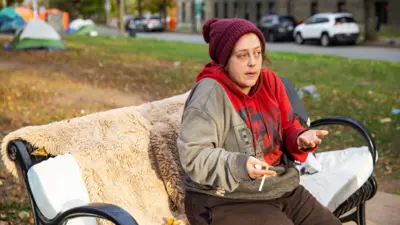We've updated our Privacy and Cookies Policy
We've made some important changes to our Privacy and Cookies Policy and we want you to know what this means for you and your data.
Mentally ill Torbay woman 'not in priority housing need'
Image source, LOCAL DEMOCRACY REPORTING SERVICE
A young woman with mental health problems has been told by a council she can cope with sleeping rough as well as an "ordinary" person.
After four weeks of temporary accommodation, Torbay Council assessed the woman as "not in priority need".
This was was despite acknowledging she suffered from depression, emotionally unstable personality disorder and borderline personality disorder.
The council said it was still supporting her to find accommodation.
Humanity Torbay, a homelessness support charity, said the council's decision was wrong.
"We are horrified and shocked that somebody with severe depression and other medical facts is deemed fit to be able to sleep on the streets," a spokesperson for the charity said.
The charity has arranged a temporary safe place for the woman to stay, according to the Local Democracy Reporting Service.
Image source, LOCAL DEMOCRACY REPORTING SERVICE
Part of the council's letter, publicised by the charity, said it accepted the difficulties the woman experienced now would be likely to get worse if she remained homeless in the "medium to long term".
However, after looking at all the facts, it believed she was "resilient enough to manage" sleeping rough occasionally without experiencing more harm "than an ordinary person would experience if they were to be in the same situation as you".
It said she would be able to cope with homelessness "as well as an ordinary person", adding that anyone who is homeless or faces being homeless would "inevitably suffer harm by undergoing that experience".
According to the 1996 Housing Act, a person who is vulnerable as a result of "old age, mental illness or handicap or physical disability" has a priority need for accommodation.
In a statement, Torbay Council said the person had the right to request a review of its decision.
It said extracts of the letter publicised by the charity did not tell the "full story".
"When anyone comes to us stating they are homeless we try to help them as much as we can... we are continuing to support this person," it added.
Top Stories
More to explore
Most read
Content is not available








